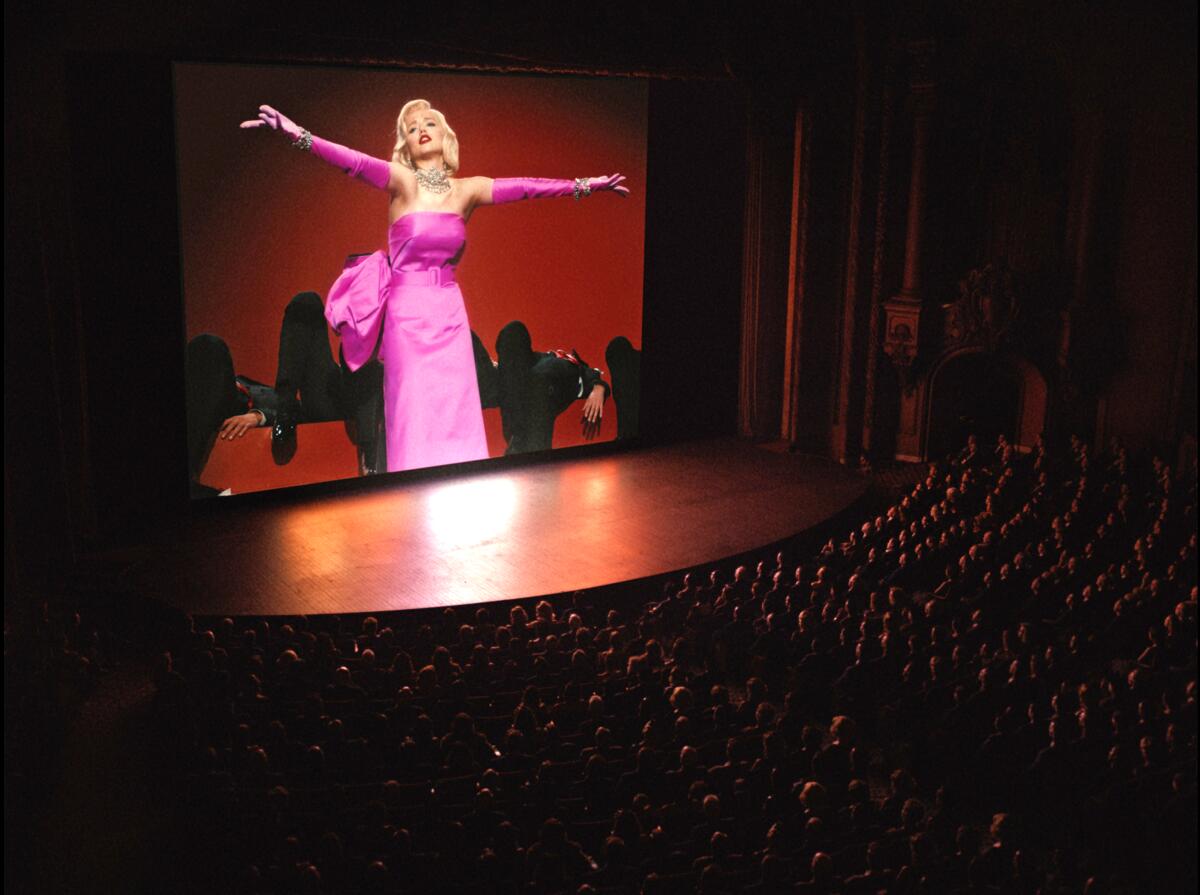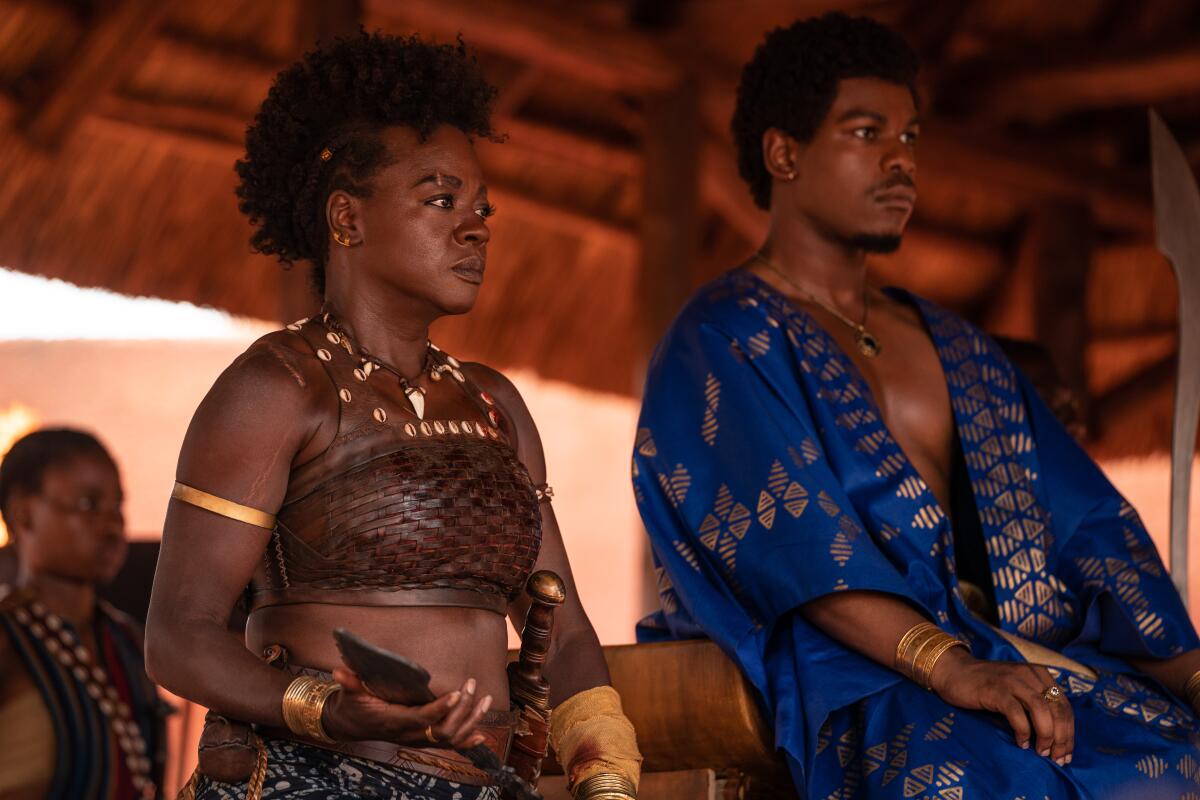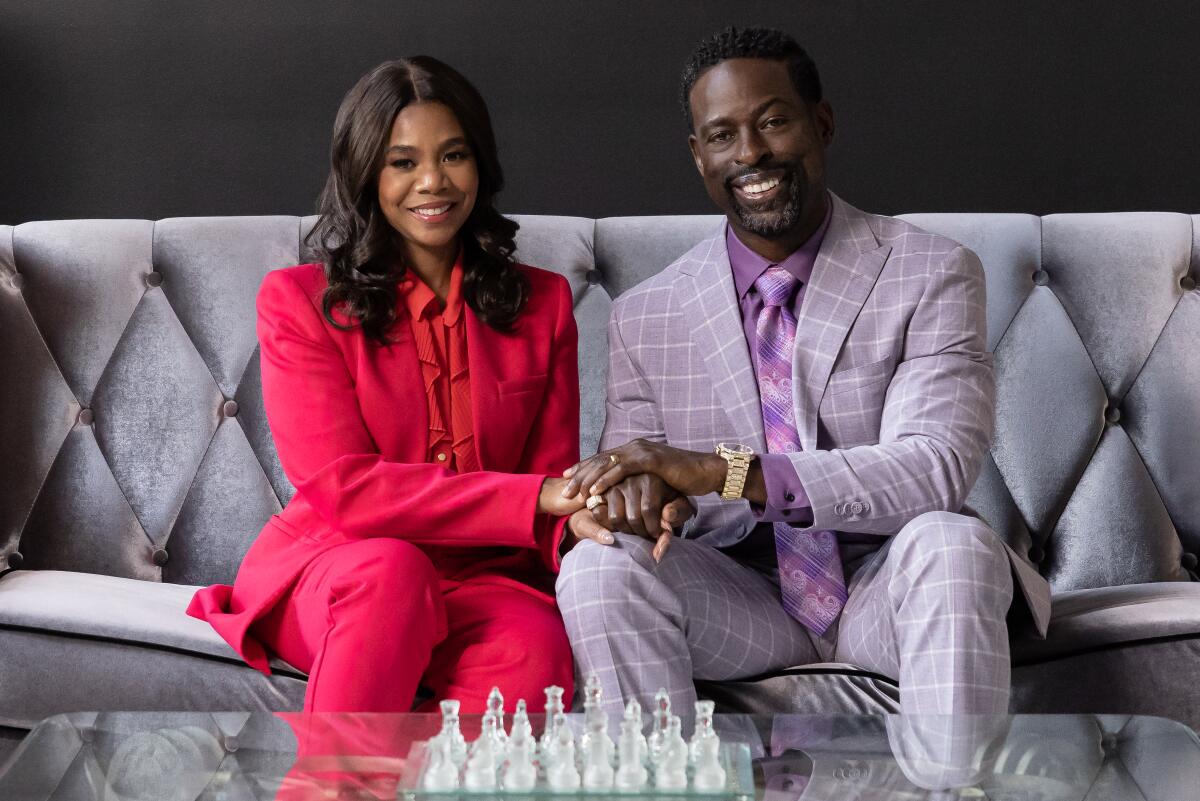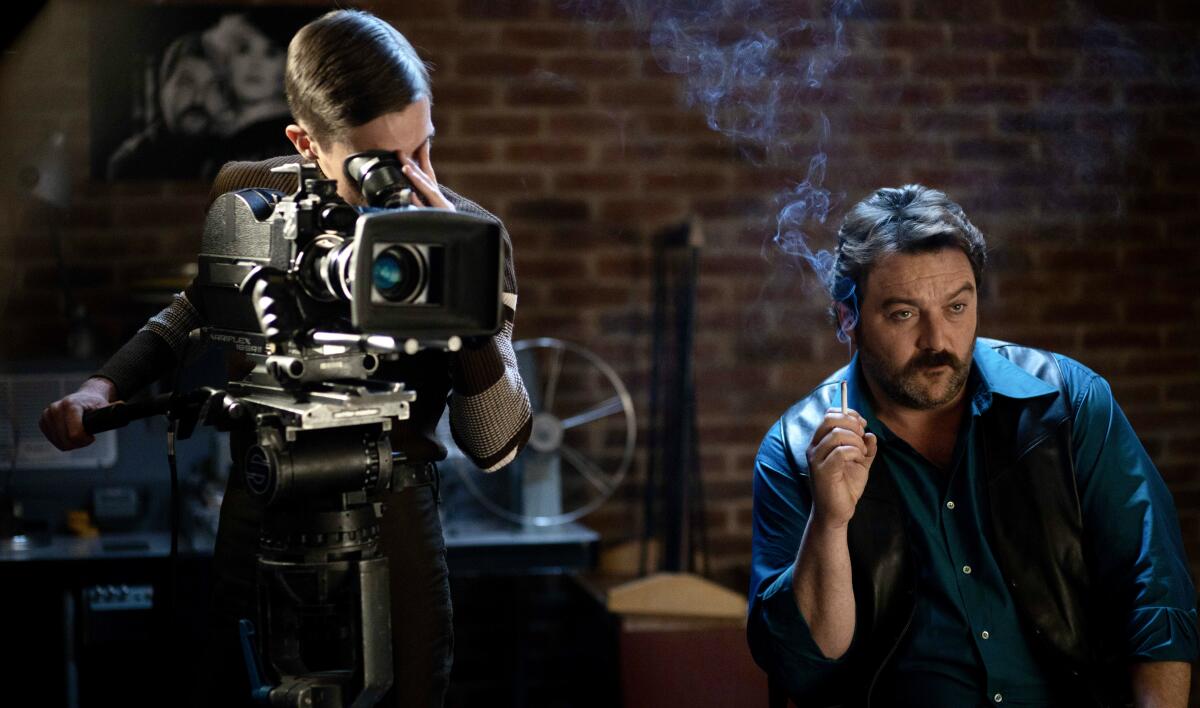Fall Movie Preview spotlights exciting new movies

- Share via
Hello! I’m Mark Olsen. Welcome to another edition of your regular field guide to a world of Only Good Movies.
Only good movies
Get the Indie Focus newsletter, Mark Olsen's weekly guide to the world of cinema.
You may occasionally receive promotional content from the Los Angeles Times.
Telluride and Venice start the season. Both the Venice and Telluride film festivals are underway, with a few filmmakers crisscrossing the globe to make it to both. With these two, along with the Toronto International Film Festival starting next week, many of the most anticipated films of the year are at last being seen by audiences.
Among the expected premieres are Noah Baumbach’s “White Noise,” Todd Field’s “Tár,” Sarah Polley’s “Women Talking,” Alejandro G. Iñárritu’s “Bardo (False Chronicle of a Handful of Truths),” Olivia Wilde’s “Don’t Worry Darling,” Luca Guadagnino’s “Bones and All” and many more.
Speaking to Josh Rottenberg, Telluride executive director Julie Huntsinger called this “a very unusual year,” one in which filmmakers, distributors and festivals are all finding their footing in a reemerging world.
Cinematheque revisits Robert Bresson ... The American Cinematheque is launching a 12-film series on French filmmaker Robert Bresson, who explored a world of faith and morality, or sometimes the lack thereof, in films such as “Pickpocket,” “Au Hasard Balthazar” and “Diary of a Country Priest.” Although Bresson’s work can seem chilly and forbidding, it is richly rewarding from even the first toe-dip, and it’s easy to see why he has been such a huge influence on generations of filmmakers, including Paul Schrader. Other titles in the series include “The Devil, Probably,” “L’Argent,” “A Man Escaped,” “Four Nights of a Dreamer,” “The Trial of Joan of Arc,” “Les Dames Du Bois De Boulogne” and more.
... and Nora Ephron. The Cinematheque is also screening a series of films by the writer-director in celebration of the new book “Nora Ephron: A Biography.” Author Kristin Marguerite Doidge will sign copies of her book at Skylight Books prior to the screenings of “You’ve Got Mail,” “When Harry Met Sally and “Sleepless in Seattle” next door at the Los Feliz 3. Somewhat the opposite of Bresson, the easy accessibility of so much of Ephron’s work masks the sharp observations and rigorous worldview she put forth.
Enjoying this newsletter? Consider subscribing to the Los Angeles Times
Your support helps us deliver the news that matters most. Become a subscriber.
Reason to get excited
Our Fall Movie Preview publishes in print Sunday, but we already have everything available online. For anyone hungry for more movies, there is a lot coming up to be excited about.
Justin Chang wrote that the fall season has filled him with a wary sense of hope, noting, “The future, like most of the movies on the horizon, remains to be seen, but at this early juncture, I’m clinging like mad to optimism. The conversation will begin at festivals, where, at the very least, movies will be seen as they were meant to be seen, in proper theaters. When those movies open, I suspect — I hope — that audiences will head to theaters, not just for air conditioning and a cheap diversion but also for the experience of being genuinely swept away by something new and exciting.”
Glenn Whipp chose 14 potential Oscar contenders, including Gina Prince-Bythewood’s “The Woman King,” David O. Russell’s “Amsterdam,” Park Chan-wook’s “Decision to Leave,” Martin McDonagh’s “The Banshees of Inisherin” and James Gray’s “Armageddon Time.”
Whipp also wrote about the use of Palm Springs Midcentury architecture in Olivia Wilde’s “Don’t Worry Darling.” Wilde recalled her first time visiting Palm Springs and being struck by its oasis-in-the-desert feeling: “It felt like the ultimate expression of man’s dominance and power. It’s so beautiful, but it’s also a really strange place. If not for all the creature comforts that man has created, you would die very quickly out here. And it’s the desert, so it’s spooky. I recall thinking that someday we have to make a horror movie out there.”
Sonaiya Kelley wrote about “The Woman King,” based on the story of the Agojie warrior women of the African kingdom of Dahomey. Directed by Prince-Bythewood and starring Viola Davis, John Boyega, Thuso Mbedu, Lashana Lynch and Sheila Atim, the film uncovers a chapter of history unknown to many.
As Prince-Bythewood said, “How much of our history has been hidden from us, ignored, tucked away? I think it’s most tragic for those of us growing up in America where our history starts with enslavement. We grow up in this country where the majority of our images, especially when it takes place in the past, is that of victims. We never learn about how we fought back. And to have a story like this to show that we literally come from warriors, I wish I had this when I was a little girl.”
Carlos Aguilar spoke to Ana de Armas about her role as Marilyn Monroe in Andrew Dominik’s “Blonde,” based on the novel by Joyce Carol Oates. Of the experience portraying such an iconic person, De Armas said, “Whatever happens with the movie, it doesn’t matter. It matters that we told a story that we believed in. It matters that I played a character that I was not supposed to play, that I challenged myself, that I grew as an actress and as a person. That’s what I take with me.”
Josh Rottenberg spoke to Luke Macfarlane, star of the gay rom-com “Bros.” Macfarlane spoke about how despite the fact he had already had a long career, including a prolific streak of Hallmark Christmas movies, “Bros” was his first audition for a studio film: “The fact is, I don’t think studio executives are saying, ‘Get me the gay guy from “Brothers and Sisters” who does all those Hallmark films.’ That’s probably not what people who run multibillion-dollar companies are thinking. [laughs] You know, careers are funny. But I have always worked and I was grateful to work.”
And among the breakout performers of the season are Danielle Deadwyler in “Till,” Harry Styles in “Don’t Worry Darling” and “My Policeman,” Paul Mescal in “Aftersun” and “God’s Creatures” and Dolly De Leon in “Triangle of Sadness.”

Enjoying this newsletter? Consider subscribing to the Los Angeles Times
Your support helps us deliver the news that matters most. Become a subscriber.
‘Honk for Jesus. Save Your Soul.’
Written and directed by Adamma Ebo and produced with her identical twin sister Adanne Ebo, the satire “Honk for Jesus. Save Your Soul.” is drawn from their experiences growing up in the community of Southern Baptist churches around Atlanta. In the film, Pastor Lee-Curtis Childs (Sterling K. Brown) and his wife and “first lady,” Trinitie (Regina Hall), attempt to rebuild their church’s congregation (and their cash flow) after the exposure of a sex scandal involving Lee-Curtis. The film is in theaters now and streaming on Peacock.
For The Times, Sarah-Tai Black wrote, “The loose mockumentary format of ‘Honk for Jesus. Save Your Soul.’ offers Hall a chance to showcase her well-established comedic chops throughout its agile runtime, but its final chapter gives her space to realize a career-best dramatic performance as effective as a raw nerve. … A first feature that is fresh as it is concise, ‘Honk for Jesus. Save Your Soul.’ presents a toothy vision of evangelical life without losing sight of the feeling that remains when the facade of it all finally falls.”
For the New York Times, Lisa Kennedy wrote, “In the end, the film doesn’t extend much compassion to the good reverend. (He has more than enough sympathy for himself.) Nor is much made of the ache that actual parishioners might experience when their mighty are fallen. Had Ebo gone in that direction, ‘Honk for Jesus.’ might have been truer but darker, landing on heart-rending over the astutely hilarious. For this oh-so-smart comedy, that would have been tragic.”
For Little White Lies, Jourdain Searles wrote, “More than simply putting Black and Brown faces in front of the camera, films that demonstrate a real understanding of the culture its portraying have real, lasting value. Adamma Ebo’s ‘Honk for Jesus. Save Your Soul.’ is one of those films, giving a thoughtful glimpse into Southern Baptist culture, zeroing in on the predatory nature of megachurches and the celebrity pastors who drain money from their congregations to fuel their lavish lifestyles. It’s a very specific story, likely alien to those with no connection to the Southern Evangelical community in America, and Ebo doesn’t go out of her way to spell everything out.”

‘Peter von Kant’
Written and directed by the prolific French filmmaker François Ozon, “Peter von Kant” is a gender-flipped reimagining of Rainer Werner Fassbinder’s 1972 film “The Bitter Tears of Petra von Kant.” In Ozon’s telling, a filmmaker (Denis Ménochet, loosely mimicking Fassbinder himself) pursues an affair with the new boyfriend (Khalil Ben Gharbia) of an actress (Isabelle Adjani) whose career he helped establish. The film is in theaters now.
For The Times, Gary Goldstein wrote, “Although set 50 years ago, writer-director Ozon’s kicky homage brings less modern-day insight and perspective to the overheated, overhauled proceedings than might be expected — or at least desired — of the out gay filmmaker. Specific as Ozon’s approach here may be (nothing feels accidental or arbitrary), his lovingly made curio, which often borrows verbatim from its predecessor, comes off a bit tired and trifling.”
For the New York Times, Beatrice Loayza wrote, “Admittedly, there’s a baked-in appeal to such an adoring resurrection of the man and the myth, through the prism of one of his most beloved works (the casting of a Fassbinder collaborator, Hanna Schygulla, as Peter’s mom, doesn’t hurt). … Fassbinder’s work finds a kind of truth in the artifice of emotionally plumped-up dramas, but Ozon’s often tedious tragicomedy never hits such a stride, trusting that the material will automatically confer greatness; instead, ‘Peter’ comes off like top-shelf fan-fiction.”

Only good movies
Get the Indie Focus newsletter, Mark Olsen's weekly guide to the world of cinema.
You may occasionally receive promotional content from the Los Angeles Times.




